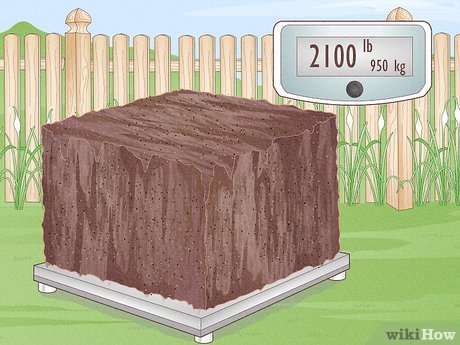
Unraveling the weight of the earth’s secrets, we embark on a journey of curiosity and wonder, delving deep into the profound question: “How much does a cubic foot of soil weigh?” This humble request for answers may appear deceptively simple, yet it holds a fascinating essence that connects us to the very fabric of nature’s intricate dance. Through the delicate balance of scientific exploration and an unwavering commitment to truth, we shall unlock the secrets hidden within every grain of earth’s terrestrial cloak. So, let us embark on this captivating exploration, where the beauty of knowledge intertwines with the weight of the world, revealing a truth nestled deep within the depths of a cubic foot of soil.

One of the key factors to consider when working with soil or landscaping projects is . This knowledge is essential for various reasons, such as determining how much soil you need for your project and ensuring the structural integrity of structures built on soil. Knowing the weight of a cubic foot of soil can also help you make informed decisions regarding transportation and storage.
So, how much does a cubic foot of soil weigh? The weight of a cubic foot of soil can vary depending on several factors, including the type of soil, moisture content, and density. On average, a cubic foot of dry soil can weigh anywhere from 75 to 100 pounds, while moist soil can weigh between 90 to 120 pounds. However, it is important to note that these are just general estimates and the weight can differ significantly based on the aforementioned factors.

Soil weight per cubic foot can vary depending on several factors that affect its density and composition. Understanding these factors is crucial for various industries such as construction, agriculture, and landscaping. Whether you’re planning to build a structure, analyzing soil fertility, or estimating transportation costs, it is important to consider the following:
-
Moisture content: The amount of moisture present in the soil significantly affects its weight. Moist soil generally weighs more than dry soil, as water adds extra mass. It’s important to note that soil moisture can fluctuate due to environmental factors and management practices.
-
Soil composition: Different types of soil have varying densities, which impacts their weight per cubic foot. Sandy soils, for instance, are typically lighter than clay-heavy soils due to their larger individual particles and lower density. Loam soils, on the other hand, often have a balanced composition and moderate weight per cubic foot.
-
Organic matter: The presence of organic matter, such as decomposed plant material or humus, can affect soil weight. Organic matter tends to be lighter than mineral components, reducing the overall weight per cubic foot, particularly in well-aerated soils with a high organic content.
To provide a quick overview, here is a table outlining some key features and tips to consider when estimating the weight of soil per cubic foot:
Loading... Seconds Left for
Miniature Orchid Terrarium Gallery!

| Feature |
Tips |
| Moisture Content |
• Soil moisture can be measured using devices such as a soil moisture meter.
• Adjust calculations based on the specific moisture content of the soil sample. |
| Soil Composition |
• Research and identify the type of soil present in your area.
• Consult soil classification systems to understand its density and weight range. |
| Organic Matter |
• Take into account the presence of organic matter in your soil sample.
• Consider the decomposition stage and its potential effect on weight. |
By considering these factors, you can make more accurate estimates of how much a cubic foot of soil weighs, promoting better decision-making in various applications. Understanding the weight of soil helps ensure the success of projects while optimizing resource management and avoiding any potential complications.

When it comes to gardening, understanding the weight of soil in your garden is essential. Whether you’re planning to build a raised bed, transport soil, or simply want to get an idea of the load your garden is supporting, knowing the weight of soil can be incredibly helpful. One commonly asked question is, “how much does a cubic foot of soil weigh?” Well, let’s dive into the details and uncover the answer.
To calculate the weight of a cubic foot of soil, you need to consider various factors. The type of soil is the primary factor, as different soils have different densities. On average, a cubic foot of dry topsoil can weigh between 75-100 pounds. However, the weight can vary based on moisture content, compaction, and organic matter. For example, sandy soil tends to be lighter, whereas clayey soil can be much heavier. To determine the exact weight of soil in your garden, you can use a simple formula: soil density (in pounds per cubic foot) = soil weight (in pounds) ÷ soil volume (in cubic feet).
| Features |
Tips |
| Consider soil composition |
Test the soil’s moisture content |
| Different soils have varying densities, so understanding the composition of your soil will help determine its weight. |
Soil moisture affects weight, so ensure the soil is adequately dry or moist when calculating its weight. |
| Account for compaction |
Include organic matter |
| If the soil is compacted, it will weigh more due to the increased particles per unit volume. |
Incorporating organic matter into the soil can affect its density and ultimately its weight, so consider this factor when calculating. |

or-managing-and-estimating-soil-weight-for-various-projects">
Tips for Managing and Estimating Soil Weight for Various Projects
When it comes to managing and estimating soil weight for your projects, understanding the weight per cubic foot is essential. This knowledge allows you to plan resources effectively and ensure the stability of structures. The weight of soil can vary depending on its composition, moisture content, and compaction level. For instance, dry soil weighs less than wet soil due to water’s significant contribution to weight.
Here are some valuable tips to help you manage and estimate soil weight:
- Perform soil sampling across the project site to determine the soil’s properties accurately.
- Consider the soil type and its corresponding density. For example, sandy soil weighs less than clayey soil.
- Account for moisture content as it significantly affects weight. Moisture can result in an increase of up to 25% in soil weight.
| Tips |
Features |
| Soil Sampling |
Determine accurate soil properties |
| Soil Type |
Consider density differences |
| Moisture Content |
Account for weight increase |
Frequently Asked Questions
Q: How much would a cubic foot of soil weigh if it were made solely of marshmallows?
A: Marshmallows’ density is quite light, so a cubic foot of marshmallow soil would weigh approximately as much as a fluffy cloud – around 0.16 pounds (72 grams).
Q: Can soil
get as heavy as a giant elephant by the magical touch of gold dust?
A: While gold has a high density, adding gold dust to soil won’t turn it into an elephant-sized heavyweight. In fact, even if the soil were entirely made of gold, a cubic foot would weigh around 1,206 pounds (546 kilograms), far from the weight of our majestic pachyderm friends.
Q: Is a cubic foot of soil strong enough to handle the weight of an army of ants?
A: Absolutely! Ants are lightweight creatures, so a cubic foot of soil can comfortably accommodate an entire army of them. To be more precise, the weight of the soil would be around 74 pounds (33.5 kilograms), which ants can easily navigate. As we wrap up our exploration into the bountiful realm of soil, the answer to the age-old question “How much does a cubic foot of soil weigh?” reveals itself. We’ve dug deep, just like the roots of a magnificent oak tree, to bring you this knowledge. Although our journey through the depths of soil may have been short, the wisdom gained is immeasurable.
With cautious steps, wielding the scales of curiosity, we discovered that the weight of a cubic foot of soil depends on various factors. Just as each seed flourishes differently in its own patch of earth, the weight of soil can vary depending on its composition, moisture content, and even geographical location. Mother Nature, it seems, has a penchant for diversity in all aspects of life – including the weight of soil!
So, dear re
ader, if you find yourself holding a cubic foot of soil in your hands, prepare for a surprise. No two handfuls of this humble substance will ever be exactly alike. The weight may range anywhere from 75 to 100 pounds, perhaps even more, offering a gentle reminder of the immense complexity that lies beneath our feet.
In the vast tapestry of nature, soil is the vital cornerstone upon which ecosystems thrive. From the blooming flowers that greet the morning sun, to the towering forests whispering secrets to the skies, the weight of this glorious earth – once hidden but now revealed – holds the secrets of life itself.
As we bid adieu to this quest for knowledge, we encourage you to embrace the earth beneath your feet. Plant your dreams within its nurturing embrace, for soil is not only the bearer of weight, but also the harbinger of life and growth. So, go forth and celebrate the weighty beauty of our humble cubic foot of soil – the silent observer of the secrets that lie beneath our very footsteps.
Hello! I'm Jessica Owen, an avid gardener and proud contributor to Up-Gardening.com. Gardening is my passion, and I'm delighted to share my green-thumb experiences with you. From planting tips to nurturing blooms, I'm here to help you cultivate your own slice of paradise. Let's grow together in the garden!
Latest posts by Jessica Owen
(see all)v>
<
!-- CONTENT END 1 -->





